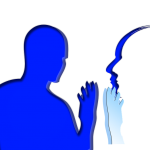Body-part Metaphors
Today, we look at body-part metaphors, also called Somatographic or Somatic idioms. They are figurative expressions that use the names of body parts to convey metaphoric meanings, which are beyond their literal sense.
In English vocabulary, body-part metaphors occur in expressions like: all ears, hand in hand, eye-opener; nose around. Others include: ‘an eye for an eye’ or “a tooth for a tooth” and “to bite the fingers that have fed one.”
In Igala speech, body-part metaphors feature frequently. Previously, we introduced the unmarked ‘Oji.’ We dealt with the few meanings it produced with its two regular’high-high’ tones (ójí):
(i) the ‘head’ of a person or other creatures. E.g. Ọ́jí áwọ̀ mí – I have a headache. (ii) thief, robber. Usually qualified as Ọ́jí abìdẹ-ọwọ́, a chronic thief. Literally, a thief with a bug in the palm. (iii) a hunch; intuition; sixth sense. E.g. Ọ́jí mi í du ṅ. – I don’t feel like (taking a particular action).
Igala idioms in which ójí occurs, include: ójí énẹla – to be elated or feel ecstatic. Ójí-ébọ – premonition; foreboding. ójí-égbó – courage, boldness. Ójí-édu-túkwú – risk-taking.
What other meanings of ójí can you think of? There are several day-to-day expressions involving ójí. Can you think of any?
Your reactions are important for learning and internalizing this word in-depth.
Word for to Today
ÉJÚ
A frequently used homophone, éjú is marked with two (high-high) tones. It has different interpretations:
(i) Eye. E.g. Ómi-akwú dẹ́ éjú mi – There were tears in my eyes. Go mí ejú: Look me in the eyes. (ii) Face; facial expression. E.g. Éjú wẹ-í nyọ̀ ṅ. The expression on your face is not friendly. The verb: Kpá-éjú: to frown. (iii) Vicinity; area. E.g. Éjú Abocho lẹ̄ ù kwóò. I am hail from Abocho area.
What other meanings of éjú can you think of?
Idioms derived from éjú include:
(iii) In the eyes of. E. g. Í nyọ̀ ejú Ọjọ́ ṅ: It is not good in the eyes of God. (It’s morally or ethically wrong).
(iv) In the presence of; to be privy to. E.g. Éjú mi ì che: It happened in my presence.









